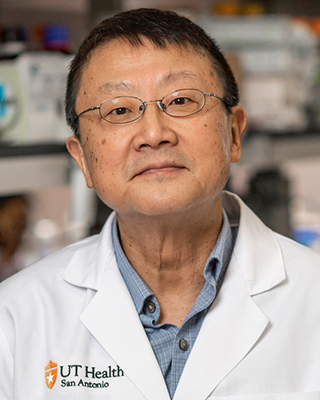March 19, 2024

For more than 30 years, biochemist Patrick Sung, Ph.D., has studied a cellular process essential to all life on earth: DNA repair. His research into how cells fix DNA damage has earned him international distinction in the environmental health science and cancer research communities.
Damage to DNA can occur in many ways, including through exposure to environmental factors like ultraviolet light and radiation. Cells have mechanisms to fix this damage. However, if those mechanisms fail, mutations — or changes in genetic information — can occur, potentially leading to cancer.
Over the decades, Sung has mentored and led seasoned and early-career scientists alike, often with support from NIEHS, in uncovering important facets of DNA repair.
“Our major strength is that we are often the first to break down the intricate mechanisms of DNA repair processes,” explained Sung, who is based at the University of Texas Health Science Center at San Antonio (UT Health San Antonio). “This makes us competitive for grants and coveted for collaborations with other researchers.”
Honing His Skills
Sung has pioneered techniques to purify, or isolate, proteins involved in DNA repair. Purification makes it possible to study the specific functions of individual repair proteins and to explore key steps of various DNA repair pathways.
When he was a doctoral student at the University of Oxford, Sung learned protein purification techniques that he uses today. He still remembers rising before dawn to collect fresh cow blood samples from a nearby slaughterhouse to study blood coagulation, or clotting. Back in the lab, Sung would extract proteins from the samples and try to reconstruct the clotting process in a test tube.
“The purpose was to see if a reaction would actually occur that mimics what goes on in the cell,” Sung explained.
From there, he could gain a better understanding of the role of each component in the reaction.
After earning his doctorate, Sung worked as a postdoctoral trainee at the University of Rochester in New York. There, his focus shifted from studying blood clotting to researching DNA repair pathways in simple organisms, such as yeast.
Sung recalled that his mentors, Louise Prakash, Ph.D., and Satya Prakash, Ph.D., were immediately impressed by his expertise in protein biochemistry.
“At the time, there were very few biochemists who could purify and test proteins involved in the DNA repair pathway under study in the Prakash lab,” Sung said.
In 1993, Sung established his own research laboratory at the University of Texas Medical Branch, where he received his first NIEHS grant to fund research on DNA repair pathways. After a couple more moves, including a long stint at Yale University, he returned to Texas in 2019 to join UT Health San Antonio.
“NIEHS funding has been critical to my work; I wouldn’t know what to do without their support,” he said.
Building a Library of Knowledge
Today, Sung is exploring proteins encoded by two genes — BRCA1 and BRCA2 — that are involved in DNA repair. Mutations in these genes are associated with increased risk of certain cancers, notably breast and ovarian cancer.
By purifying the BRCA1 and BRCA2 proteins, researchers can understand how they interact with other proteins in the DNA repair process. Then, they can determine how mutations in the pertinent genes might hinder DNA repair.
However, the large size and structural intricacy of the BRCA1 and BRCA2 proteins make them exceedingly difficult to study, according to Sung. But that is where his team excels, he said.
“You can count on one hand the number of groups in the world that are able to purify these proteins in biologically active forms,” Sung noted. “Ours is one of them.”
With NIEHS support, Sung and colleagues demonstrated that specific regions of the BRCA2 protein are vital to the DNA repair process. Mutations in these regions give rise to impaired proteins that fail to interact properly with RAD51, a protein pivotal to DNA repair.
Those findings, along with additional analyses published in 2023, provided important insight into the roles of BRCA and RAD51 proteins. Studying the relationship between these proteins is crucial to understanding how certain types of cancer occur.
“Our findings not only shed light on how cancers develop in humans, but also inform the development of targeted interventions to mitigate the adverse effects of environmental stress on DNA and human health,” Sung explained.
Guiding the Next Generation
As a testament to Sung’s leadership in the field, the majority of his senior research associates from Yale followed him to his Texas lab, where he also mentors 18 graduate students and postdocs.
Former students and junior faculty seek his counsel as well.

Sung (center) with research colleagues at UT Health San Antonio. (Photo courtesy of Patrick Sung)
“I still write letters for and advise students and postdoctoral fellows who left my lab 20 years ago,” Sung noted. “And as associate dean for research, a main part of my purview is to help junior faculty with grant writing. I’ve helped many researchers win NIH-funded and other grants.”
In 2023, UT Health San Antonio recognized Sung’s influence with the Distinguished Mentor Award.
“Mentoring is a lifelong commitment,” he said. “It is hands-on and time-consuming to guide and critique someone’s work from start to finish. But in the end, it is the most satisfying part of my job.”


